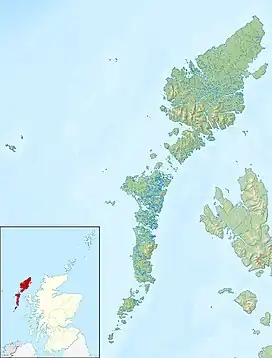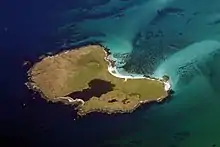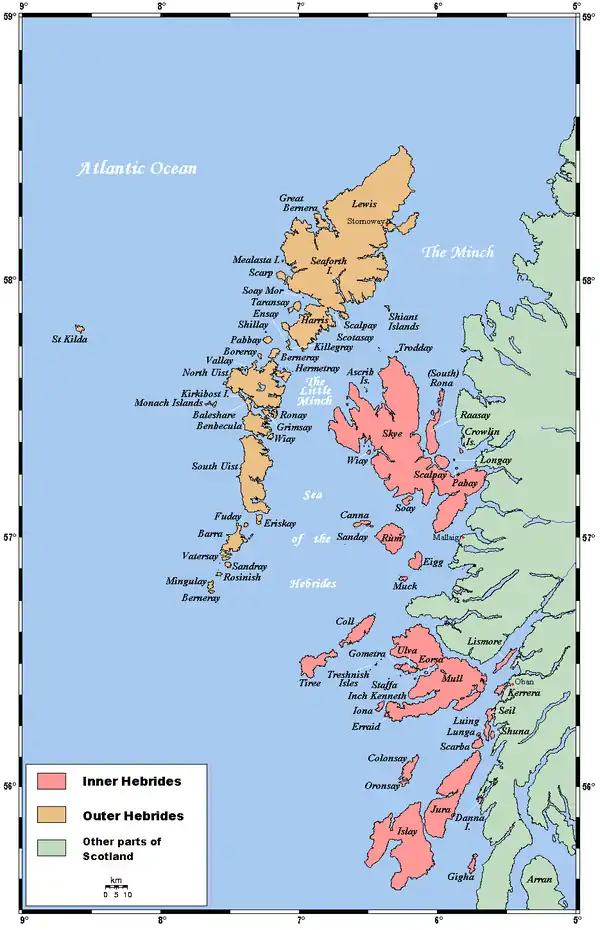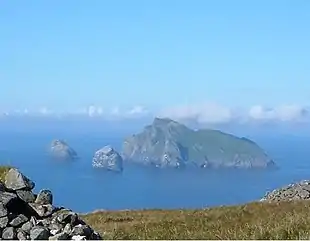| Scottish Gaelic name | Boraraigh |
|---|---|
| Pronunciation | [ˈpɔɾəɾaj] |
| Old Norse name | Boreray |
| Meaning of name | fort island |
| Location | |
 Boreray Boreray shown within the Outer Hebrides | |
| OS grid reference | NF855815 |
| Coordinates | 57°42′46″N 7°16′59″W / 57.7128°N 7.283°W |
| Physical geography | |
| Island group | Uist and Barra |
| Area | 198 ha (489 acres) |
| Area rank | 110 [1] |
| Highest elevation | Mullach Mòr 56 m (184 ft) |
| Administration | |
| Sovereign state | United Kingdom |
| Country | Scotland |
| Council area | Outer Hebrides |
| Demographics | |
| Population | 0[2] |
| References | [3][4][5] |
Boreray (Scottish Gaelic: Boraraigh) is an island with a single croft, lying 2 kilometres (1.2 mi) north of North Uist in the Outer Hebrides of Scotland.
Geography
The north of the island is hilly and dominated by Mullach Mòr. The single croft and buildings are situated in the north-east of the island. The north is largely separated from the flatter southern half by Loch Mòr (big loch) and a strip of sand dunes.
History

The island was occupied from prehistoric times. From the fifteenth century, it was owned by the MacLeans.[6] The thirteenth MacLean of Boreray left the island in around 1810, and the island was divided into twenty crofts. The population grew quickly, and 181 inhabitants were recorded in the 1841 census.[7] Through the 19th century there were over 100 people living there.
Over-cultivation and the collapse of the kelp trade brought a gradual decline in the population.[6] In 1923, the island was evacuated at the request of the islanders. One family stayed on until the 1960s, when the island was abandoned. In 1999, the present crofter started rebuilding work and remains the island's sole regular inhabitant.[7]
Today
_-_geograph.org.uk_-_755605.jpg.webp)
The single croft forms the north-east part of the island. The grazing rights for the remainder are leased to the crofters of the nearby island of Berneray.
Footnotes
- ↑ Area and population ranks: there are c. 300 islands over 20 ha in extent and 93 permanently inhabited islands were listed in the 2011 census.
- ↑ National Records of Scotland (15 August 2013). "Appendix 2: Population and households on Scotland's Inhabited Islands" (PDF). Statistical Bulletin: 2011 Census: First Results on Population and Household Estimates for Scotland Release 1C (Part Two) (PDF) (Report). SG/2013/126. Retrieved 14 August 2020.
- ↑ Haswell-Smith, Hamish (2004). The Scottish Islands. Edinburgh: Canongate. p. 263. ISBN 978-1-84195-454-7.
- ↑ Ordnance Survey. OS Maps Online (Map). 1:25,000. Leisure.
- ↑ Mac an Tàilleir, Iain (2003) Ainmean-àite/Placenames. (pdf) Pàrlamaid na h-Alba. Retrieved 26 August 2012.
- 1 2 "Overview of Boreray". Gazetteer for Scotland. Retrieved 14 December 2008.
- 1 2 "Boreray - History". boreray-island.co.uk. Retrieved 30 August 2009.
External links
57°42′46″N 7°17′0″W / 57.71278°N 7.28333°W

